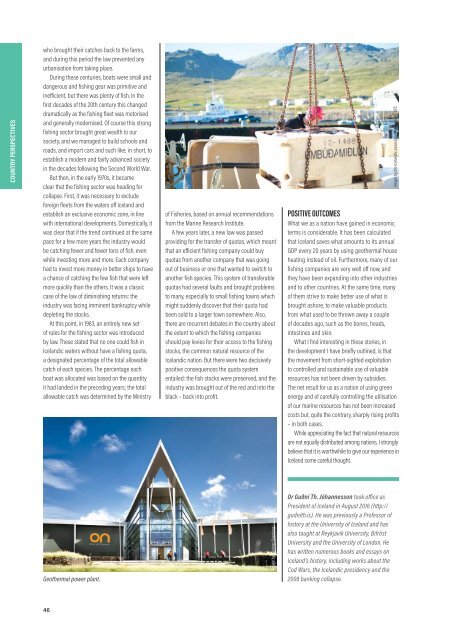Climate Action 2016-2017
Create successful ePaper yourself
Turn your PDF publications into a flip-book with our unique Google optimized e-Paper software.
COUNTRY PERSPECTIVES<br />
who brought their catches back to the farms,<br />
and during this period the law prevented any<br />
urbanisation from taking place.<br />
During these centuries, boats were small and<br />
dangerous and fishing gear was primitive and<br />
inefficient, but there was plenty of fish. In the<br />
first decades of the 20th century this changed<br />
dramatically as the fishing fleet was motorised<br />
and generally modernised. Of course this strong<br />
fishing sector brought great wealth to our<br />
society, and we managed to build schools and<br />
roads, and import cars and such like; in short, to<br />
establish a modern and fairly advanced society<br />
in the decades following the Second World War.<br />
But then, in the early 1970s, it became<br />
clear that the fishing sector was heading for<br />
collapse. First, it was necessary to exclude<br />
foreign fleets from the waters off Iceland and<br />
establish an exclusive economic zone, in line<br />
with international developments. Domestically, it<br />
was clear that if the trend continued at the same<br />
pace for a few more years the industry would<br />
be catching fewer and fewer tons of fish, even<br />
while investing more and more. Each company<br />
had to invest more money in better ships to have<br />
a chance of catching the few fish that were left<br />
more quickly than the others. It was a classic<br />
case of the law of diminishing returns: the<br />
industry was facing imminent bankruptcy while<br />
depleting the stocks.<br />
At this point, in 1983, an entirely new set<br />
of rules for the fishing sector was introduced<br />
by law. These stated that no one could fish in<br />
Icelandic waters without have a fishing quota,<br />
a designated percentage of the total allowable<br />
catch of each species. The percentage each<br />
boat was allocated was based on the quantity<br />
it had landed in the preceding years; the total<br />
allowable catch was determined by the Ministry<br />
of Fisheries, based on annual recommendations<br />
from the Marine Research Institute.<br />
A few years later, a new law was passed<br />
providing for the transfer of quotas, which meant<br />
that an efficient fishing company could buy<br />
quotas from another company that was going<br />
out of business or one that wanted to switch to<br />
another fish species. This system of transferable<br />
quotas had several faults and brought problems<br />
to many, especially to small fishing towns which<br />
might suddenly discover that their quota had<br />
been sold to a larger town somewhere. Also,<br />
there are recurrent debates in the country about<br />
the extent to which the fishing companies<br />
should pay levies for their access to the fishing<br />
stocks, the common natural resource of the<br />
Icelandic nation. But there were two decisively<br />
positive consequences the quota system<br />
entailed: the fish stocks were preserved, and the<br />
industry was brought out of the red and into the<br />
black – back into profit.<br />
Image by the Icelandic association of fisheries, SFS.<br />
POSITIVE OUTCOMES<br />
What we as a nation have gained in economic<br />
terms is considerable. It has been calculated<br />
that Iceland saves what amounts to its annual<br />
GDP every 20 years by using geothermal house<br />
heating instead of oil. Furthermore, many of our<br />
fishing companies are very well off now, and<br />
they have been expanding into other industries<br />
and to other countries. At the same time, many<br />
of them strive to make better use of what is<br />
brought ashore, to make valuable products<br />
from what used to be thrown away a couple<br />
of decades ago, such as the bones, heads,<br />
intestines and skin.<br />
What I find interesting in these stories, in<br />
the development I have briefly outlined, is that<br />
the movement from short-sighted exploitation<br />
to controlled and sustainable use of valuable<br />
resources has not been driven by subsidies.<br />
The net result for us as a nation of using green<br />
energy and of carefully controlling the utilisation<br />
of our marine resources has not been increased<br />
costs but, quite the contrary, sharply rising profits<br />
– in both cases.<br />
While appreciating the fact that natural resources<br />
are not equally distributed among nations, I strongly<br />
believe that it is worthwhile to give our experience in<br />
Iceland some careful thought.<br />
Geothermal power plant.<br />
Image by Gunnar Svanberg.<br />
Dr Guðni Th. Jóhannesson took office as<br />
President of Iceland in August <strong>2016</strong> (http://<br />
gudnith.is). He was previously a Professor of<br />
history at the University of Iceland and has<br />
also taught at Reykjavik University, Bifröst<br />
University and the University of London. He<br />
has written numerous books and essays on<br />
Iceland’s history, including works about the<br />
Cod Wars, the Icelandic presidency and the<br />
2008 banking collapse.<br />
46












